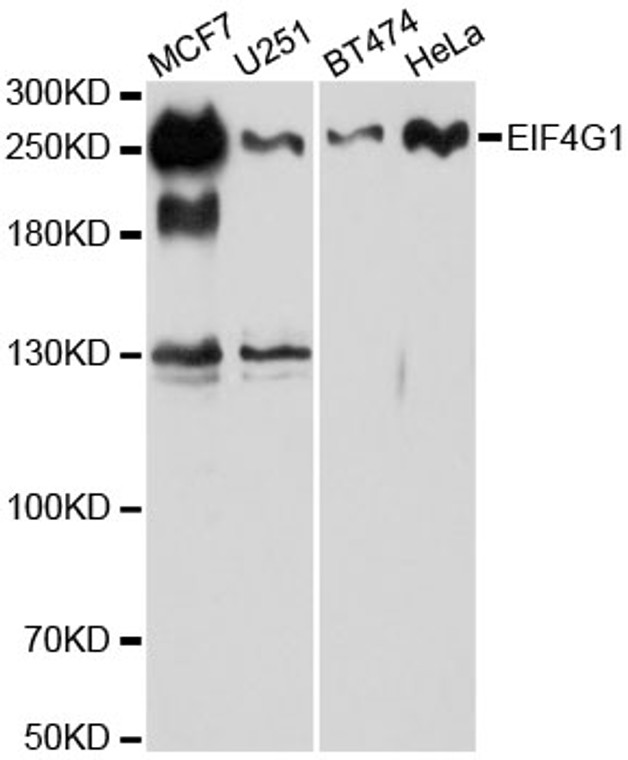| Host: |
Rabbit |
| Applications: |
WB/IHC |
| Reactivity: |
Human |
| Note: |
STRICTLY FOR FURTHER SCIENTIFIC RESEARCH USE ONLY (RUO). MUST NOT TO BE USED IN DIAGNOSTIC OR THERAPEUTIC APPLICATIONS. |
| Short Description: |
Rabbit polyclonal antibody anti-EIF4G (400-500) is suitable for use in Western Blot and Immunohistochemistry research applications. |
| Clonality: |
Polyclonal |
| Conjugation: |
Unconjugated |
| Isotype: |
IgG |
| Formulation: |
PBS with 0.02% Sodium Azide, 50% Glycerol, pH7.3. |
| Purification: |
Affinity purification |
| Dilution Range: |
WB 1:500-1:1000IHC-P 1:50-1:200 |
| Storage Instruction: |
Store at-20°C for up to 1 year from the date of receipt, and avoid repeat freeze-thaw cycles. |
| Gene Symbol: |
EIF4G1 |
| Gene ID: |
1981 |
| Uniprot ID: |
IF4G1_HUMAN |
| Immunogen Region: |
400-500 |
| Immunogen: |
A synthetic peptide corresponding to a sequence within amino acids 400-500 of human EIF4G1 (NP_886553.3). |
| Immunogen Sequence: |
PEELLNGAPSPPAVDLSPVS EPEEQAKEVTASMAPPTIPS ATPATAPSATSPAQEEEMEE EEEEEEGEAGEAGEAESEKG GEELLPPESTPIPANLSQNL E |
| Post Translational Modifications | Phosphorylated at multiple sites in vivo. Phosphorylation at Ser-1185 by PRKCA induces binding to MKNK1. Following infection by certain enteroviruses, rhinoviruses and aphthoviruses, EIF4G1 is cleaved by the viral protease 2A, or the leader protease in the case of aphthoviruses. This shuts down the capped cellular mRNA transcription. |
| Function | Component of the protein complex eIF4F, which is involved in the recognition of the mRNA cap, ATP-dependent unwinding of 5'-terminal secondary structure and recruitment of mRNA to the ribosome. Exists in two complexes, either with EIF1 or with EIF4E (mutually exclusive). Together with EIF1, is required for leaky scanning, in particular for avoiding cap-proximal start codon. Together with EIF4E, antagonizes the scanning promoted by EIF1-EIF4G1 and locates the start codon (through a TISU element) without scanning. As a member of the eIF4F complex, required for endoplasmic reticulum stress-induced ATF4 mRNA translation. |
| Protein Name | Eukaryotic Translation Initiation Factor 4 Gamma 1Eif-4-Gamma 1Eif-4g 1Eif-4g1P220 |
| Database Links | Reactome: R-HSA-1169408Reactome: R-HSA-156827Reactome: R-HSA-166208Reactome: R-HSA-429947Reactome: R-HSA-450408Reactome: R-HSA-72649Reactome: R-HSA-72662Reactome: R-HSA-72702Reactome: R-HSA-72706Reactome: R-HSA-9010553Reactome: R-HSA-975956Reactome: R-HSA-975957 |
| Cellular Localisation | CytoplasmNucleusStress Granule |
| Alternative Antibody Names | Anti-Eukaryotic Translation Initiation Factor 4 Gamma 1 antibodyAnti-Eif-4-Gamma 1 antibodyAnti-Eif-4g 1 antibodyAnti-Eif-4g1 antibodyAnti-P220 antibodyAnti-EIF4G1 antibodyAnti-EIF4F antibodyAnti-EIF4G antibodyAnti-EIF4GI antibody |
Information sourced from Uniprot.org
12 months for antibodies. 6 months for ELISA Kits. Please see website T&Cs for further guidance






![Immunohistochemistry analysis of CRMP2/DPYSL2 in paraffin-embedded mouse brain using [KO Validated] CRMP2/CRMP2/DPYSL2 Rabbit polyclonal antibody (STJ116781) at dilution of 1:400 (40x lens). Perform high pressure antigen retrieval with 10 mM citrate buffer pH 6. 0 before commencing with immunohistochemistry staining protocol. Immunohistochemistry analysis of CRMP2/DPYSL2 in paraffin-embedded mouse brain using [KO Validated] CRMP2/CRMP2/DPYSL2 Rabbit polyclonal antibody (STJ116781) at dilution of 1:400 (40x lens). Perform high pressure antigen retrieval with 10 mM citrate buffer pH 6. 0 before commencing with immunohistochemistry staining protocol.](https://cdn11.bigcommerce.com/s-zso2xnchw9/images/stencil/300x300/products/95755/377906/STJ116781_1__52305.1713145321.jpg?c=1)

